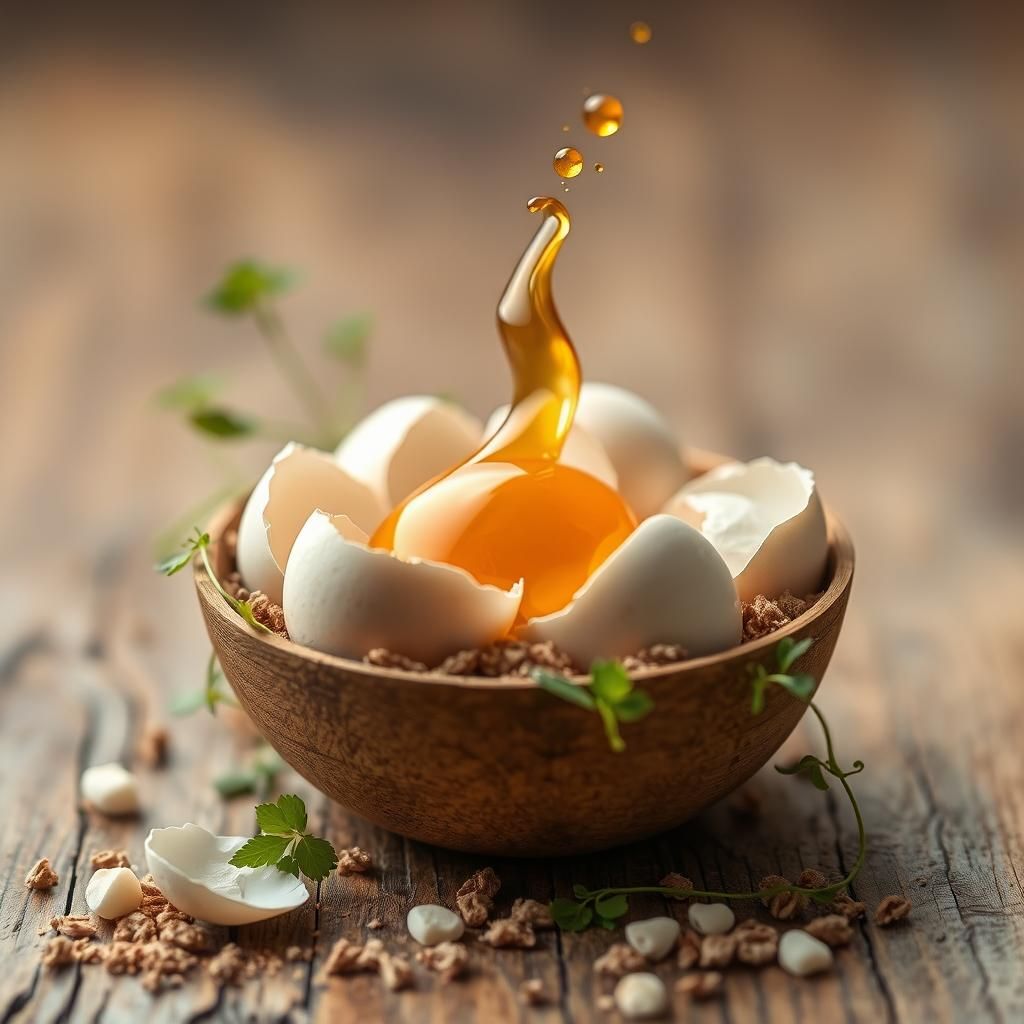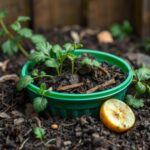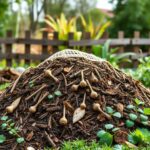Can Eggshells Be Composted? Discover the Benefits and Best Practices

Eggshells are often seen as kitchen waste, but they hold a wealth of potential for composting enthusiasts. Rich in calcium and other essential nutrients, these natural waste products can enhance your compost pile and promote healthy plant growth. Yet, many people remain unaware of the benefits and best practices for including eggshells in their compost. In this article, we will explore the advantages of composting eggshells, from their nutrient contribution to their role in improving soil structure. Additionally, we will provide tips on how to prepare and incorporate eggshells effectively into your compost routine, maximizing their benefits for your garden.
Can Eggshells Be Composted?
Yes, eggshells can be composted, and they are a beneficial addition to your compost pile. Eggshells are primarily made of calcium carbonate, which helps to balance the pH levels in compost and provides essential nutrients for plants. When crushed and added to a compost pile, they break down slowly over time, enriching the compost with calcium that enhances soil structure and supports plant growth. However, it’s important to rinse them to remove any remaining egg residue, as this can attract pests. By incorporating eggshells into your compost, you recycle kitchen waste effectively and contribute to the overall health of your garden.
Nutritional Benefits of Eggshells
Eggshells are rich in nutrients such as calcium, which is vital for plant growth and development. The calcium present in eggshells helps strengthen cell walls in plants, leading to more robust foliage and stronger root systems. Additionally, they contain trace minerals like magnesium, sulfur, and potassium, which also play a role in plant health. By composting eggshells, you ensure that these essential nutrients are returned to the soil, enhancing its fertility and supporting the growth of your plants.
How to Prepare Eggshells for Composting
To effectively compost eggshells, start by rinsing them thoroughly to remove any leftover egg whites or yolks, which can attract pests. After rinsing, allow the eggshells to dry completely, either by air-drying for a few hours or baking them at a low temperature for a short time. Once they are dry, crush the eggshells into smaller pieces or grind them into a fine powder. This increased surface area allows for quicker decomposition, making it easier for the nutrients to be released into the compost.
Potential Issues with Composting Eggshells
While composting eggshells is generally beneficial, there are some potential issues to consider. If not prepared properly, residues from the eggs can attract pests such as rats or flies. Additionally, adding too many eggshells without balancing them with other green materials can lead to a nitrogen imbalance in your compost pile. It’s essential to maintain a good mix of greens and browns in your compost to ensure successful decomposition. Monitoring the compost’s moisture levels and stirring it regularly will also help mitigate any potential problems.
Using Eggshells in Your Garden
Beyond composting, there are additional ways to utilize eggshells in your garden. Crushed eggshells can be sprinkled directly onto the soil as a natural slug deterrent or as a calcium boost for plants like tomatoes and peppers that require extra nutrients. They can also be used to create a homemade fertilizer when blended with other organic materials. Using eggshells in these formats not only recycles kitchen waste but also enhances the sustainability of gardening practices.
See also:
The Environmental Impact of Composting Eggshells
Composting eggshells contributes positively to the environment by reducing kitchen waste that would otherwise end up in landfills. By diverting eggshells from waste streams and incorporating them into compost, you help to produce nutrient-rich soil that fosters plant growth and reduces the need for chemical fertilizers. This practice encourages a healthier ecosystem and promotes sustainable gardening practices, enhancing biodiversity and improving soil health over time.
| Benefits | Ingredients | Tips for Use |
|---|---|---|
| Rich in calcium | Eggshells | Rinse and dry before composting |
| Balances pH levels | Magnesium, sulfur, potassium | Crush into smaller pieces for quicker breakdown |
| Deters pests | Can be used in garden soil | Mix with other organic materials |
| Reduces kitchen waste | Homemade fertilizer | Maintain a balance of greens and browns in compost |
Which plants do not like egg shells?
Eggshells are often used in gardening as a natural source of calcium, but not all plants thrive when exposed to them. Some plants may be negatively affected by the addition of eggshells due to their specific soil requirements or sensitivity to changes in pH levels.
1. Acid-Loving Plants
Many plants that prefer acidic soil do not appreciate the addition of eggshells. This is because eggshells can raise the pH of the soil, making it less acidic.
- Blueberries - These plants thrive in highly acidic soil with a pH of 4.5 to 5.5.
- Cranberries - They also require acidic environments for optimal growth.
- Azaleas - Preferring acidic conditions, azaleas might suffer when eggshells are added.
2. Certain Herbs
Some herbs flourish in soil that is not too alkaline, and the calcium from eggshells can alter the soil chemistry.
- Basil - Prefers neutral to slightly acidic soil, and eggshells can shift this balance.
- Cilantro - This herb prefers slightly acidic conditions.
- Thyme - While adaptable, it can become stressed in overly alkaline conditions.
3. Plants Sensitive to Soil Composition
Certain plants are particularly sensitive to changes in soil composition and can be adversely affected by the addition of materials like eggshells.
See also:
- Orchids - Sensitive to their growing medium, eggshells can disrupt their preferred environment.
- Ferns - These plants thrive in specific, often acidic, soil conditions.
- Peace Lilies - They prefer slightly acidic soil and may exhibit stress from increased alkalinity.
4. Vegetables with Specific pH Requirements
Certain vegetables have specific pH needs and might not respond well to eggshells altering the soil’s acidity.
- Potatoes - They prefer slightly acidic soil, and eggshells may raise pH levels beyond their comfort.
- Carrots - These root vegetables can be affected by changes in soil composition.
- Radishes - They thrive best in neutral to slightly acidic soils.
5. Plants in Container Gardens
In container gardens, soil pH can be more easily affected, and the alteration caused by eggshells may harm sensitive plants.
- Succulents - They prefer well-draining soils with specific pH levels and may not thrive with added calcium.
- Begonias - These plants are sensitive to pH changes and may not do well with eggshell addition.
- Pansies - They flourish in slightly acidic conditions and can suffer from alkalinity due to eggshells.
Questions from Our Readers
Can eggshells be composted?
Yes, eggshells can be composted. They are a great addition to your compost pile as they provide essential nutrients like calcium, which helps balance the pH levels in the compost and supports plant growth.
How should eggshells be prepared for composting?
Before composting, it is advisable to clean and crush the eggshells to speed up the decomposition process. Breaking them into smaller pieces increases their surface area, allowing microorganisms in the compost to break them down more efficiently.
Will composting eggshells attract pests?
If used in moderation, composting eggshells is unlikely to attract pests. However, it’s important to ensure that the compost pile is well-aerated and balanced with green materials to minimize any potential issues.
How long do eggshells take to decompose in compost?
Eggshells typically take about three to six months to decompose in compost, depending on factors like temperature, moisture, and whether they are crushed. Proper composting techniques can help speed up this process.
See also:

If you want to read more articles like Can Eggshells Be Composted? Discover the Benefits and Best Practices, we recommend you check out our Compost category.
Leave a Reply

Related Articles